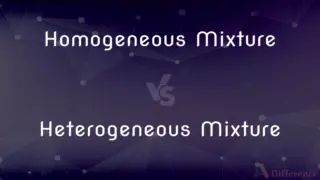Catholic Bible vs. Christian Bible — What's the Difference?
By Tayyaba Rehman & Fiza Rafique — Published on March 8, 2024
The Catholic Bible includes the Deuterocanonical books, making it larger, whereas the Christian Bible typically refers to Protestant versions, which exclude these books.

Difference Between Catholic Bible and Christian Bible
Table of Contents
ADVERTISEMENT
Key Differences
The term "Christian Bible" commonly refers to the sacred scriptures of Christianity, encompassing both the Old Testament and the New Testament. However, the content can vary among Christian denominations. For instance, the Protestant Bible, often referred to in this general context, excludes the Deuterocanonical books considered canonical by the Catholic Church. On the other hand, the Catholic Bible includes these Deuterocanonical books, such as Tobit, Judith, and the Maccabees, among others, in its Old Testament, reflecting a broader canon.
Regarding the New Testament, both the Catholic and Protestant Bibles contain the same 27 books, from the Gospel according to Matthew to the Book of Revelation. This similarity underscores a fundamental agreement on the canon of the New Testament writings, despite differences in the Old Testament. Whereas the inclusion of the Deuterocanonical books in the Catholic Bible represents a significant distinction in the scope of the Old Testament.
The Deuterocanonical books included in the Catholic Bible have historical and doctrinal significance for Catholics, contributing to practices and teachings distinct from those in Protestantism. These books are considered apocryphal and are not found in the Protestant Bible, which adheres to the Jewish Tanakh's canon for its Old Testament. This difference in canon reflects the diverse paths of tradition and scripture interpretation within Christianity.
The development of the canon in the early Christian Church influenced the selection of books in the Catholic and Protestant Bibles. The Catholic Church's canon, ratified at the Council of Trent in the 16th century, affirmed the inclusion of the Deuterocanonical books. Conversely, the Protestant Reformation led by figures such as Martin Luther questioned the canonicity of these books, resulting in their exclusion from the Protestant Bible.
In terms of translation and publication, both Catholic and Protestant Bibles are available in various versions and languages, reflecting the diversity within Christianity. The Catholic Church has specific translations it approves for liturgical use, such as the New American Bible, while Protestantism has a wide range of translations favored by different denominations, including the King James Version and the New International Version. This variety exemplifies the richness of biblical interpretation and the importance of scripture across Christian traditions.
ADVERTISEMENT
Comparison Chart
Old Testament Canon
Includes Deuterocanonical books (e.g., Tobit, Judith, Maccabees)
Excludes Deuterocanonical books, aligns with the Jewish Tanakh
New Testament Canon
27 books, identical to Protestant New Testament
27 books, identical to Catholic New Testament
Doctrinal Significance
Deuterocanonical books influence certain doctrines and practices
Doctrines and practices based on a 66-book canon
Historical Development
Canon established firmly in the 16th century at the Council of Trent
Canon influenced by the Reformation and early Church Fathers
Popular Translations
New American Bible, Douay-Rheims Bible
King James Version, New International Version
Compare with Definitions
Catholic Bible
Includes 73 books, integrating the Deuterocanonical books.
The Catholic Bible's Old Testament includes the Book of Tobit.
Christian Bible
Basis for Protestant doctrine and practice.
Protestant teachings and services use the 66-book Christian Bible.
Catholic Bible
Translations approved by the Catholic Church for use.
The New American Bible is a popular Catholic Bible translation in the U.S.
Christian Bible
Reflects the Reformation's emphasis on scriptures.
Martin Luther's translation of the Bible was pivotal in Protestant history.
Catholic Bible
Guides Catholic doctrine and practices.
The inclusion of the Deuterocanonical books influences certain Catholic doctrines.
Christian Bible
Typically contains 66 books, excluding the Deuterocanonical books.
The Protestant Bible consists of 39 Old Testament and 27 New Testament books.
Catholic Bible
Used in liturgy and teachings within the Catholic Church.
Catholic mass readings are taken from the approved Catholic Bible.
Christian Bible
Used across various Protestant denominations.
Different Protestant denominations favor specific translations of the Bible.
Catholic Bible
The canon was ratified at the Council of Trent.
The Council of Trent played a key role in defining the Catholic Bible's canon.
Christian Bible
Includes translations like the King James and New International Version.
The King James Version is a historic and revered Protestant Bible translation.
Common Curiosities
Do Catholics and Protestants use different Bible translations?
Yes, each tradition has preferred translations approved or favored for liturgical use and personal study.
Are there differences in the New Testament between Catholic and Protestant Bibles?
No, both contain the same 27 books in the New Testament.
What are the Deuterocanonical books?
Books included in the Catholic but not in the Protestant Old Testament, such as Tobit, Judith, and Maccabees.
Why does the Protestant Bible exclude the Deuterocanonical books?
They align with the Jewish Tanakh's canon and were excluded during the Reformation for lacking Hebrew originals, among other reasons.
How do the Catholic and Protestant Bibles influence their respective doctrines?
The inclusion or exclusion of certain books impacts theological beliefs, practices, and interpretations of Christian doctrine.
How does the Orthodox Christian Bible's canon compare to these?
The Orthodox Bible includes even more books in its Old Testament, differing from both Catholic and Protestant canons.
How were the canons of the Catholic and Protestant Bibles determined?
The Catholic canon was affirmed at the Council of Trent, while the Protestant canon was shaped by the Reformation and earlier Church Fathers.
Why are Bible translations important in Catholic and Protestant traditions?
Translations reflect theological perspectives and are key for worship, doctrine, and personal study within each tradition.
What role did the Council of Trent play in the Catholic Bible's canon?
It definitively established the Catholic Church's canon, including the Deuterocanonical books.
Can the Deuterocanonical books be found in any Protestant Bibles?
Some Protestant Bibles, like certain editions of the King James Version, include them in a separate section called the Apocrypha.
What are some major approved Catholic Bible translations?
The New American Bible and the Douay-Rheims Bible are among the approved translations for liturgical use in the Catholic Church.
Is there a difference in the number of Psalms between the Catholic and Protestant Bibles?
No, both traditions include 150 Psalms, although the numbering can vary slightly due to different translations and textual traditions.
Are there ecumenical efforts to bridge differences in Bible canons?
Ecumenical dialogues address these differences, but canonical texts remain distinct between traditions.
Why are the Deuterocanonical books significant for Catholics?
They hold historical, doctrinal, and liturgical significance, influencing Catholic teachings and practices.
What impact did Martin Luther have on the Protestant Bible?
Luther translated the Bible into German and influenced the Protestant canon by excluding the Deuterocanonical books.
Share Your Discovery

Previous Comparison
Homogeneous Mixture vs. Heterogeneous Mixture
Next Comparison
Social Marketing vs. Social Media MarketingAuthor Spotlight
Written by
Tayyaba RehmanTayyaba Rehman is a distinguished writer, currently serving as a primary contributor to askdifference.com. As a researcher in semantics and etymology, Tayyaba's passion for the complexity of languages and their distinctions has found a perfect home on the platform. Tayyaba delves into the intricacies of language, distinguishing between commonly confused words and phrases, thereby providing clarity for readers worldwide.
Co-written by
Fiza RafiqueFiza Rafique is a skilled content writer at AskDifference.com, where she meticulously refines and enhances written pieces. Drawing from her vast editorial expertise, Fiza ensures clarity, accuracy, and precision in every article. Passionate about language, she continually seeks to elevate the quality of content for readers worldwide.













































